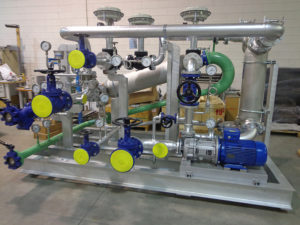

The design and engineering of a thermoregulating unit using diathermic oil for the heating cycle requires very special attention and caution, more than any other type of thermoregulating unit. This in order to ensure the correct and safe working conditions, combined with the maximum performance efficiency and to proceed with the proper selection of components. This kind of thermoregulating unit usually works at ambient pressure, with open expansion vessels. In higher power capacity units, it is also common to find closed pressurizes expansion vessels. Open vessel units are anyway employed in the majority of applications, which in turn are divided in two thermodynamic typologies: the first one uses diathermic oil in a range between 180 and 200° C, the second one in a range between 200 and 350° C.
When high working temperature conditions are involved, electrical resistors have a negligible impact on costs and selection of the components. Anyway, the most important thing is to have electrical resistances with low specific heat in order to avoid deterioration of the diathermic oil. It is also suitable the presence of an inert element, aimed to avoid heat transmission to the electrical connections cabinet. It is also mandatory a safety thermostat for high temperature.
The best choice are security bellows type valves, in order to minimize possible accidental leaks.
For higher working temperature conditions, which become very challenging for a thermoregulating unit, it is instead important to choose accurately what kind of circulating pumps and exchangers are the most suitable and performing.
With small and medium flow rates and diathermic oil over 200° C, it is suitable to opt for magnetic drive pumps, that eliminate issues related to mechanical seals. High flow rates will require instead special flux pumps with high temperature resistant flushed mechanical seals.
For high temperature operations, nickel brazed exchangers are the best solution. On the connection side, it is surely suitable to avoid threaded connections, because the thermal expansions will lead to oil leaks. It is thus preferable to use only welded or flanged connections, and graphite reinforced gaskets or spyrometallic gaskets.
